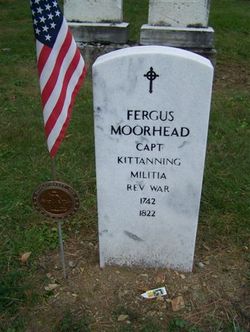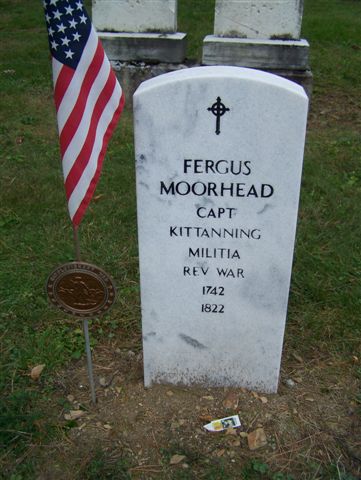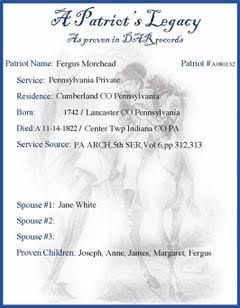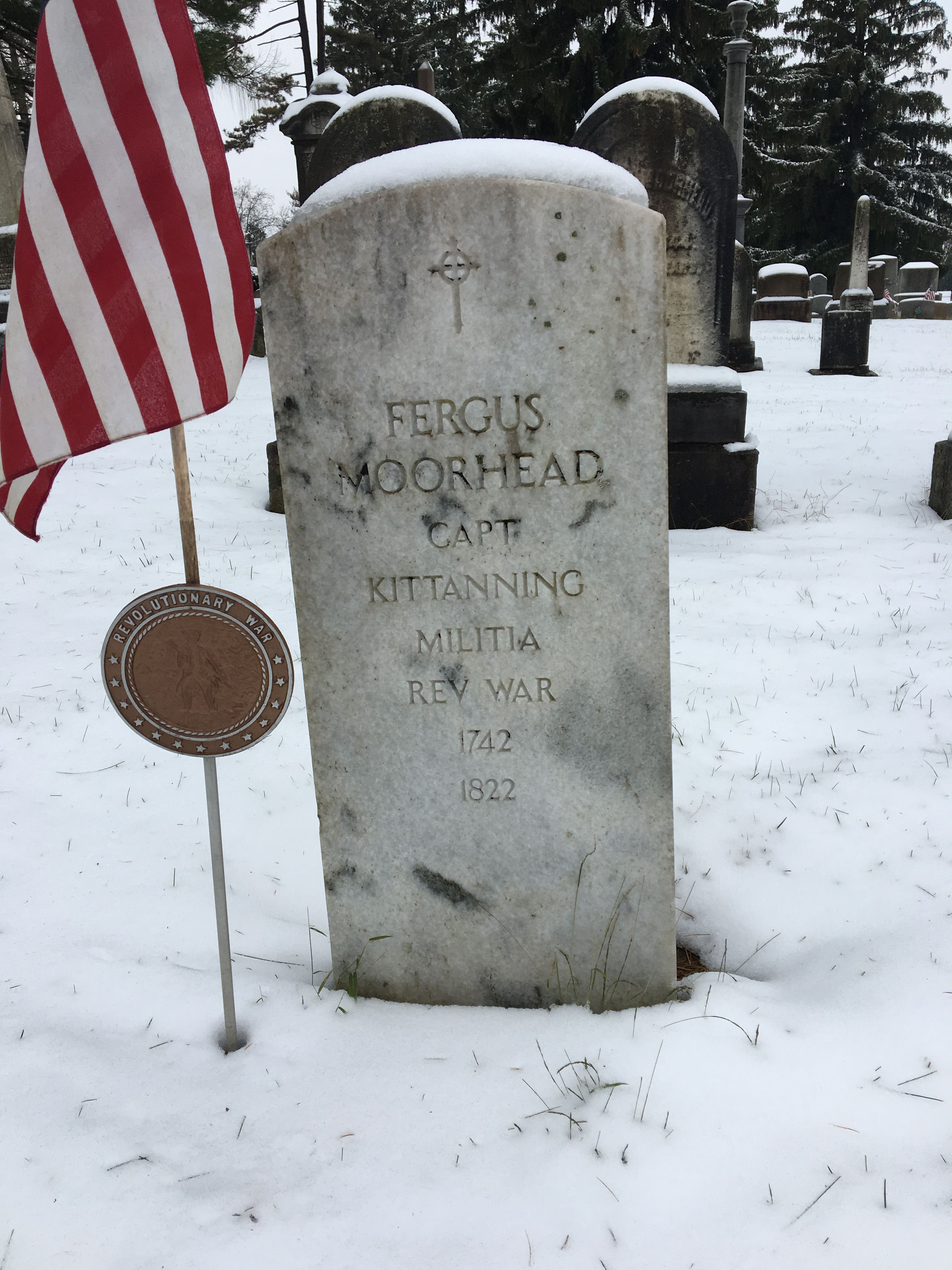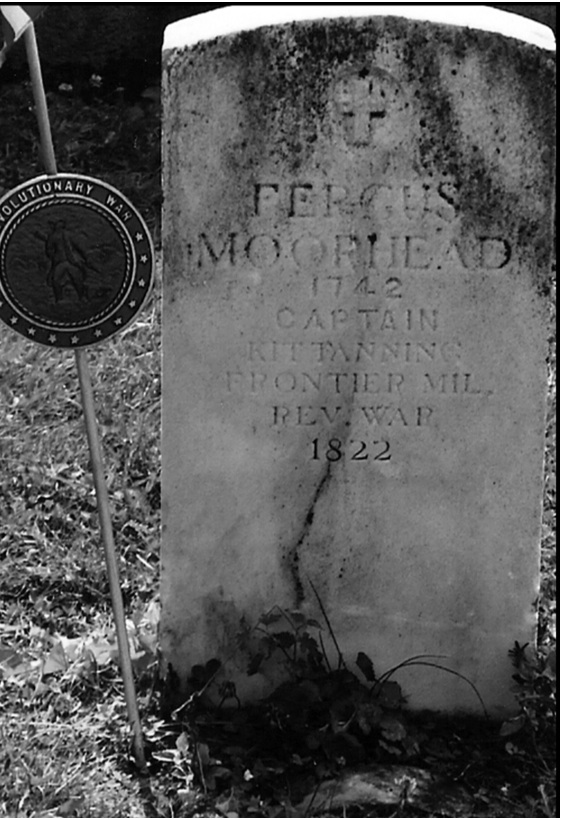Fergus married Jane White on 9 Aug 1766 and they had 12 children they named: Joseph, Euphemia, Margaret, Fergus, Thomas, Jane, Samuel, James, John, Sarah, Mary and Catherine Moorhead.
Extended BIO Info:
In the month of May 1772, Fergus Moorhead, his wife and three children, his two brothers, Samuel and Joseph, James Kelly, James Thompson and a few others, bid farewell to their friends and relatives in Franklin County, and set out on their journey to the "Indian country" west of the Allegheny. Though the prospects of acquiring extensive possessions and wealth for themselves and posterity, might buoy up the adventurous spirits of the three brothers, it may well be imagined that Mrs. Moorhead left home and all its endearments, with a heavy heart. But, being a woman possessing great energy of character, as is shown in the sequel, and touched, perhaps, with that romantic spirit peculiar to that period of which we are writing then pressed forward with a firm stop and a resolute heart, determined to share with her de-voted husband the dangers and trials of the wilderness
Fergus had a wagon in which he places the provisions necessary for the journey, his farming utensils and household effects. This was drawn by three oxen, two milk cows, several head of sheep and hogs, and a lot of fowls. The progress of the party was necessarily slow. The military road, opened out some years previous from Cumberland to Fort Pitt, was the only one that led at that time across the mountains, and was in many places scarcely traceable, while it occasionally passed through swamps and revines, and then again over rocks and along mountain slopes, so as to render it almost impassable. But even this road, bad as it was, had to be abandoned, as its course diverged considerable from the point which the adventurers wished to gain. Hence they had to make their way, as best they could through the wilderness.
It would be a fruitless task to attempt a description of the toils, the hardships and the dangers, to which the party were daily and hourly exposed. Beasts of prey were roaming on all sides, seeking an op-portunity to devour them. The rattle snake and copperhead lay coiled among the weeds and bushes, ready to strike the deadly blow. And, most dangerous of all the war whoop which sounded from hill to hill, and echoed through the intervening valleys gave warning of the proximity of the savage, thirsting for plunder and for blood.
In the night and in the day the party were continually exposed to danger. With naught but the heavens for a covering they laid down at night to rest themselves, and forget for a few hours the fatigue of the day in the lap of "nature's fond nurse, balmy sleep," while one of the party stood as sentinel, not knowing what moment they might be attacked by the wild beasts or the Indians. In the day they had often to halt, and cut away logs and remove other impediments, and as there were no bridges, they had fre-quently to cross streams at imminent peril.
At length, at the end of four weeks from the time they had left Franklin County, the party reached the point of their destination. Where the town of Indiana is now built, was the spot that had been selected for a settlement by Fergus Moorhead, who had made an excursion into this section in 1770.
For reasons which to them were obvious, the party changed their determination, and located a few miles further west. Though they were now relieved from the fatigue incident to their journey, our pioneers were far from living at their ease. Having sat themselves down in the forest, without house or shelter, and remote from the nearest settlement, we may readily imagine that their situation was far from comfortable. But "where there is a will there is a way," and this trite saying was abundantly verified in the case of the Moorheads.
The land that was passed down to Isaac A. Moorhead was that which they selected for their future residence. On the first day, they naturally looked around to find a spot of ground on which to erect buildings that would answer their immediate necessities, and selected the site of the Isaac Moorhead house. On the next morning, they commenced the work of building a cabin. After finishing their houses they built pens for their horses, cows, oxen, sheep, hogs, and fowls.
When these were completed they were once more enabled to lie down, if not under their own "vine and fig trees," at least beneath their own roof, and enjoy the refreshing sweets of slumber. We next see them laying the "Axe to the Root" of the sturdy oaks of the forest and prostrating them with unsparing hands. They then planted some corn and potatoes, for which they have cleared and grubbed a small patch of ground, and after this put another one in order for their brother and his family to return home. By this time the harvest was rapidly approaching, and it was necessary that Fergus should obtain provision for his stock. In this respect, he was very highly favored. The land subsequently owned by David Ralston, south of Indiana, was then partly clear of timber and brush, and clothed with a coat of luxuriant grass, of which he cut a sufficient quantity to supply his animals during the whole winter.
He then employed himself in clearing land for the purpose of raising grain. The difficulties of the pioneer's life can only be fully apprehended fully by those who have had such experience as this fam-ily had, and the hardships and annoyances are almost beyond human conception. They were buoyed up with the promise made far back in the days that were numbered with the past, that "the desert places should be made glad and the wilderness to blossom as the rose.
The greatest annoyance was the venomous reptiles and beasts of prey, with which the country abounded. It was almost miraculous if they could go beyond their cabin door without hearing the quick snap of the vice-like jaws of the wolf or seeing the subtle panther crouching on a neighboring tree, its fiercely brilliant eyes peering through the thick frontage, or the bloodshot eyes of the catamount glaring hideously from a neighboring thicket. It was nothing uncommon to be confronted by a huge bear or two, who were at all times ready to greet them with a friendly "hug."
The copper-head and rattle-snakes were so numerous that, attracted by the shelter of the house, they would steal into it and secrete themselves in the beds or any place that would afford them conceal-ment. The cunning fox, too, could be seen loitering around in constant readiness to commit some petty depredation.
Their cattle were in imminent danger of the most ferocious of these animals, and not unfre-quently Mr. Moorhead or his wife was placed under the necessity of taking the dogs and going to their relief, if they could not excape and get to the house. At night they were very much annoyed by their at-tacking the cattle or sheep in their pens, and Mr. Moorhead would frequently be forced to arise and assist the dogs in driving them away. This was always attended with the greatest danger, from the fact before mentioned, that the snakes were so numerous as to almost preclude the possibility of excaping unharmed. They were also in constant dread of the Indians, who when the attention of the dogs were drawn to the nocturnal deprecators of the cattle and sheep pens, might seize the opportunity to attack the family in their wildwood home.
He had brought with him a sufficient quanity of flour to answer his wants till his potatoes and corn would be matured, and fit for use in the fall. The corn he had to carry to the mill on the Kiskimeni-tis, in what is now Westmoreland county, to be ground into meal. Here new difficulties had to be encoun-tered, inasmuch as he had to go to the intervening distance between his house and the mill, without the aid of a road, his course lying through the woods, up hill and down dale; through brake, bush and swamp, and his only guide, the bright sun that shone in the heavens above him. At night he had to lie outdoors, and his horses had to content themselves with such sustenance as the woods afforded. The dangers of the day would only be supplanted by those of the night. We can imagine that his was "not very comforting condition," and the thought that his wife and three children, in the midst of the wild forests, was not cal-culated to add to his peace of mind.
The wild game which abounded in the woods, supplied his with all the animal food of which he was in need, but for salt, tobacco, iron, clothes, etc., he had to return to Franklin county, and these articles had also to be packed across the mountains, on horseback. This was no small undertaking for one-man, nor was it unattended by great danger, for it required three or four weeks to make the journey. During all that time, he would travel day and night, halting only long enough to permit his horse to graze on the grass that grew in the woods, which was the only food upon which they had to subsist not knowing at what moment he might be killed by the Indians, or devoured by some wild beast. The reflection that his small family might be at the mercy of the savages, and that on his return he might find them murdered, his home burned, and his goods destroyed was a source of infinite concern to him, and but served to urge him along the more speedily.
Such were the difficulties and anxieties under which Mr. Moorhead lived for four years from the time he left the fireside and his home in Franklin county, and located in what is now Indiana county, till the ever memorable year of 1776.
Independence year was fraught with important national events and individual incidents. In that year the American colonies took active measures to shake off the "British York," and in the same year several engagements, on land and on the sea, occurred. The British employed all the Indians that would engage on their side to the number, as had been estimated, of about twelve thousand, but many small par-ties, acting as spies and marauders on the frontier, were not included in that estimate.
At this time of which we write, Samuel Moorhead, who had been elected, captain was stationed, (in July, 1776), with a small company of backwoods militia, at Kittanning. Being attached with the small pox, he was unable to perform his duty as an officer and on this account went to his brother, Fergus and prevailed on him to take command of the company, while he remained with Fergus' family until he had recovered from his illness. He then returned to Kittanning, and he and Fergus passed the evening to-gether in talking about their family and friends, and planning how they should manage their business. It was agreed that Fergus should return to his home on the following morning, in company with a soldier named Simpson.
A party of Indians, who were lurking around the fort, happened to overhear the conversation of the Moorheads, and, being well acquainted with the road Moorhead and Simpson would take in the morning-- it being what was then known as the "Kittanning Path"-- they secreted themselves near it, on a hill, since called Blanket Hill, about midway between Kittanning and Moorhead's and there awaited the approach of their intended victims. Upon the arrival of Moorhead and Simpson, who, though on horse-back and armed did not suspect an attack, the Indians fired, killing Simpson and the two horses on the spot, and before Moorehad could extract himself they seized him and made him a prisoner. After scalping Simpson they stripped off his clothes and left his naked body lying at the side of the path, with the two dead horses.
.
Fergus married Jane White on 9 Aug 1766 and they had 12 children they named: Joseph, Euphemia, Margaret, Fergus, Thomas, Jane, Samuel, James, John, Sarah, Mary and Catherine Moorhead.
Extended BIO Info:
In the month of May 1772, Fergus Moorhead, his wife and three children, his two brothers, Samuel and Joseph, James Kelly, James Thompson and a few others, bid farewell to their friends and relatives in Franklin County, and set out on their journey to the "Indian country" west of the Allegheny. Though the prospects of acquiring extensive possessions and wealth for themselves and posterity, might buoy up the adventurous spirits of the three brothers, it may well be imagined that Mrs. Moorhead left home and all its endearments, with a heavy heart. But, being a woman possessing great energy of character, as is shown in the sequel, and touched, perhaps, with that romantic spirit peculiar to that period of which we are writing then pressed forward with a firm stop and a resolute heart, determined to share with her de-voted husband the dangers and trials of the wilderness
Fergus had a wagon in which he places the provisions necessary for the journey, his farming utensils and household effects. This was drawn by three oxen, two milk cows, several head of sheep and hogs, and a lot of fowls. The progress of the party was necessarily slow. The military road, opened out some years previous from Cumberland to Fort Pitt, was the only one that led at that time across the mountains, and was in many places scarcely traceable, while it occasionally passed through swamps and revines, and then again over rocks and along mountain slopes, so as to render it almost impassable. But even this road, bad as it was, had to be abandoned, as its course diverged considerable from the point which the adventurers wished to gain. Hence they had to make their way, as best they could through the wilderness.
It would be a fruitless task to attempt a description of the toils, the hardships and the dangers, to which the party were daily and hourly exposed. Beasts of prey were roaming on all sides, seeking an op-portunity to devour them. The rattle snake and copperhead lay coiled among the weeds and bushes, ready to strike the deadly blow. And, most dangerous of all the war whoop which sounded from hill to hill, and echoed through the intervening valleys gave warning of the proximity of the savage, thirsting for plunder and for blood.
In the night and in the day the party were continually exposed to danger. With naught but the heavens for a covering they laid down at night to rest themselves, and forget for a few hours the fatigue of the day in the lap of "nature's fond nurse, balmy sleep," while one of the party stood as sentinel, not knowing what moment they might be attacked by the wild beasts or the Indians. In the day they had often to halt, and cut away logs and remove other impediments, and as there were no bridges, they had fre-quently to cross streams at imminent peril.
At length, at the end of four weeks from the time they had left Franklin County, the party reached the point of their destination. Where the town of Indiana is now built, was the spot that had been selected for a settlement by Fergus Moorhead, who had made an excursion into this section in 1770.
For reasons which to them were obvious, the party changed their determination, and located a few miles further west. Though they were now relieved from the fatigue incident to their journey, our pioneers were far from living at their ease. Having sat themselves down in the forest, without house or shelter, and remote from the nearest settlement, we may readily imagine that their situation was far from comfortable. But "where there is a will there is a way," and this trite saying was abundantly verified in the case of the Moorheads.
The land that was passed down to Isaac A. Moorhead was that which they selected for their future residence. On the first day, they naturally looked around to find a spot of ground on which to erect buildings that would answer their immediate necessities, and selected the site of the Isaac Moorhead house. On the next morning, they commenced the work of building a cabin. After finishing their houses they built pens for their horses, cows, oxen, sheep, hogs, and fowls.
When these were completed they were once more enabled to lie down, if not under their own "vine and fig trees," at least beneath their own roof, and enjoy the refreshing sweets of slumber. We next see them laying the "Axe to the Root" of the sturdy oaks of the forest and prostrating them with unsparing hands. They then planted some corn and potatoes, for which they have cleared and grubbed a small patch of ground, and after this put another one in order for their brother and his family to return home. By this time the harvest was rapidly approaching, and it was necessary that Fergus should obtain provision for his stock. In this respect, he was very highly favored. The land subsequently owned by David Ralston, south of Indiana, was then partly clear of timber and brush, and clothed with a coat of luxuriant grass, of which he cut a sufficient quantity to supply his animals during the whole winter.
He then employed himself in clearing land for the purpose of raising grain. The difficulties of the pioneer's life can only be fully apprehended fully by those who have had such experience as this fam-ily had, and the hardships and annoyances are almost beyond human conception. They were buoyed up with the promise made far back in the days that were numbered with the past, that "the desert places should be made glad and the wilderness to blossom as the rose.
The greatest annoyance was the venomous reptiles and beasts of prey, with which the country abounded. It was almost miraculous if they could go beyond their cabin door without hearing the quick snap of the vice-like jaws of the wolf or seeing the subtle panther crouching on a neighboring tree, its fiercely brilliant eyes peering through the thick frontage, or the bloodshot eyes of the catamount glaring hideously from a neighboring thicket. It was nothing uncommon to be confronted by a huge bear or two, who were at all times ready to greet them with a friendly "hug."
The copper-head and rattle-snakes were so numerous that, attracted by the shelter of the house, they would steal into it and secrete themselves in the beds or any place that would afford them conceal-ment. The cunning fox, too, could be seen loitering around in constant readiness to commit some petty depredation.
Their cattle were in imminent danger of the most ferocious of these animals, and not unfre-quently Mr. Moorhead or his wife was placed under the necessity of taking the dogs and going to their relief, if they could not excape and get to the house. At night they were very much annoyed by their at-tacking the cattle or sheep in their pens, and Mr. Moorhead would frequently be forced to arise and assist the dogs in driving them away. This was always attended with the greatest danger, from the fact before mentioned, that the snakes were so numerous as to almost preclude the possibility of excaping unharmed. They were also in constant dread of the Indians, who when the attention of the dogs were drawn to the nocturnal deprecators of the cattle and sheep pens, might seize the opportunity to attack the family in their wildwood home.
He had brought with him a sufficient quanity of flour to answer his wants till his potatoes and corn would be matured, and fit for use in the fall. The corn he had to carry to the mill on the Kiskimeni-tis, in what is now Westmoreland county, to be ground into meal. Here new difficulties had to be encoun-tered, inasmuch as he had to go to the intervening distance between his house and the mill, without the aid of a road, his course lying through the woods, up hill and down dale; through brake, bush and swamp, and his only guide, the bright sun that shone in the heavens above him. At night he had to lie outdoors, and his horses had to content themselves with such sustenance as the woods afforded. The dangers of the day would only be supplanted by those of the night. We can imagine that his was "not very comforting condition," and the thought that his wife and three children, in the midst of the wild forests, was not cal-culated to add to his peace of mind.
The wild game which abounded in the woods, supplied his with all the animal food of which he was in need, but for salt, tobacco, iron, clothes, etc., he had to return to Franklin county, and these articles had also to be packed across the mountains, on horseback. This was no small undertaking for one-man, nor was it unattended by great danger, for it required three or four weeks to make the journey. During all that time, he would travel day and night, halting only long enough to permit his horse to graze on the grass that grew in the woods, which was the only food upon which they had to subsist not knowing at what moment he might be killed by the Indians, or devoured by some wild beast. The reflection that his small family might be at the mercy of the savages, and that on his return he might find them murdered, his home burned, and his goods destroyed was a source of infinite concern to him, and but served to urge him along the more speedily.
Such were the difficulties and anxieties under which Mr. Moorhead lived for four years from the time he left the fireside and his home in Franklin county, and located in what is now Indiana county, till the ever memorable year of 1776.
Independence year was fraught with important national events and individual incidents. In that year the American colonies took active measures to shake off the "British York," and in the same year several engagements, on land and on the sea, occurred. The British employed all the Indians that would engage on their side to the number, as had been estimated, of about twelve thousand, but many small par-ties, acting as spies and marauders on the frontier, were not included in that estimate.
At this time of which we write, Samuel Moorhead, who had been elected, captain was stationed, (in July, 1776), with a small company of backwoods militia, at Kittanning. Being attached with the small pox, he was unable to perform his duty as an officer and on this account went to his brother, Fergus and prevailed on him to take command of the company, while he remained with Fergus' family until he had recovered from his illness. He then returned to Kittanning, and he and Fergus passed the evening to-gether in talking about their family and friends, and planning how they should manage their business. It was agreed that Fergus should return to his home on the following morning, in company with a soldier named Simpson.
A party of Indians, who were lurking around the fort, happened to overhear the conversation of the Moorheads, and, being well acquainted with the road Moorhead and Simpson would take in the morning-- it being what was then known as the "Kittanning Path"-- they secreted themselves near it, on a hill, since called Blanket Hill, about midway between Kittanning and Moorhead's and there awaited the approach of their intended victims. Upon the arrival of Moorhead and Simpson, who, though on horse-back and armed did not suspect an attack, the Indians fired, killing Simpson and the two horses on the spot, and before Moorehad could extract himself they seized him and made him a prisoner. After scalping Simpson they stripped off his clothes and left his naked body lying at the side of the path, with the two dead horses.
.
Gravesite Details
Bio information is courtesy of Jack Gilchrist, findagrave member #47124171 and he is a distant relative of Fergus
Family Members
Advertisement
Records on Ancestry
-
Geneanet Community Trees Index
-
Global, Find a Grave® Index for Burials at Sea and other Select Burial Locations, 1300s-Current
-
U.S. and International Marriage Records, 1560-1900
-
Pennsylvania, Women in the Revolutionary War, 1775-1783
-
Pennsylvania, U.S., Wills and Probate Records, 1683-1993
Sponsored by Ancestry
Advertisement
